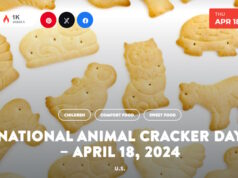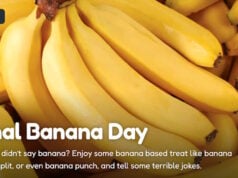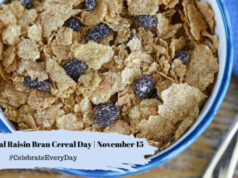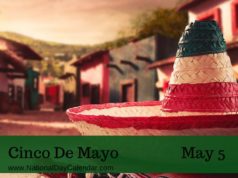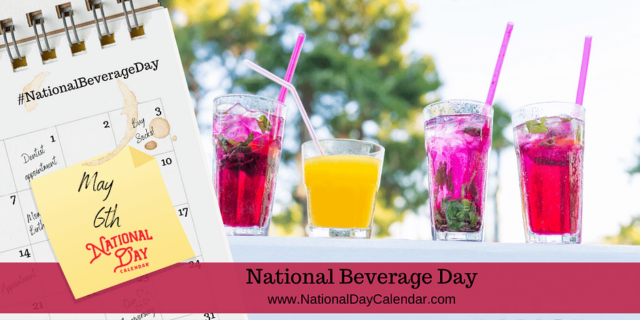
National Beverage Day on May 6th encourages us to sit back, relax, and enjoy our favorite beverages.
- The first recorded beers were made in ancient Egypt, where it was so weak that even children drank it. However, it is suspected that beer could date back to the Neolithic period.
- The world’s first coffee as we know it today is thought to have been made by a Yemeni named Omar in the 16th century.
- Coca-Cola, on the other hand, was created relatively recently, in the late 19th century.
- In ancient cultures, people believed that bathing and drinking mineral waters from springs, which were naturally carbonated, could cure many diseases.
- As such, scientists and inventors sought ways to artificially produce these mineral waters. Artificially produced carbonated beverages get their start from this; the first carbonated beverages were just non-flavored carbonated water sold as mineral water tonics.
- The first flavored carbonated drinks were created in the United States in 1807 by Townsend Speakman. The purpose of adding flavor wasn’t just to make it taste better, but also to improve on the supposed natural curative properties of mineral water. Popular ingredients to add were birch bark, dandelions, ginger, lemon, coca, and kola.
- The father of the soft drink industry is generally held to be German Swiss jeweler Jacob Schweppe, who was the first large-scale producer of aerated water around 1783.
- The first known reference of the term “Pop”, as referring to a beverage, was in 1812 in a letter written by English poet Robert Southey; in this letter, he also explains the term’s origin: “Called on A. Harrison and found he was at Carlisle, but that we were expected to supper; excused ourselves on the necessity of eating at the inn; supped there upon trout and roast foul, drank some most admirable cyder, and a new manufactory of a nectar, between soda-water and ginger-beer, and called pop, because ‘pop goes the cork’ when it is drawn, and pop you would go off too if you drank too much of it.”
- The term “soda-pop” was a moniker given to carbonated beverages due to the fact that people thought the bubbles were produced from soda (sodium bicarbonate), as with certain other products that were popular at that time. A more correct moniker would have been “carbonated-pop”.
- Keeping aerated drinks in a bottle was a huge problem for a long time in the distribution of soft drinks. As such, until the advent of crown cork (crown cap), carbonated beverages were generally only available in pharmacies.
- Over 1500 types of cork and other bottle stopper patents were filed to attempt to stop aerated drinks from losing their carbonation too quickly. Finally, in 1891, in the United States, William Painter invented the “crown cork”, which gave the first truly effective, mass-producible, way to stop the carbonation from escaping from bottled carbonated drinks. This allowed, for the first time, people to buy carbonated beverages they could store at home.
- The earliest mention of a National Beverage Day was in 1921 when “Bottled Carbonated Beverage Day” was named in a trade publication called The Re-Ly-On Bottler.
- The most consumed beverage in the world is tea.
- Beer takes second place.
- Water is not considered a beverage!
- In 2013, after more than 20 years of soda being America’s number one beverage, water has taken over as Americans’ favorite drink. – Source
- The largest beverage company in the world is Coca-Cola.
- If you shine ultraviolet light on tonic water, it becomes fluorescent, because of the quinine in it.
- The first carbonated drinks were made in the United States in 1807.
- Dean Martin was often seen carrying a glass of whiskey. In actual fact, he rarely, if ever, drank. The image was just part of his act.
- The official drink of the USA is bourbon.
- Lots of children first became entrepreneurs when they opened a lemonade stand near their home.
- 10% of the people account for 60% of sales of alcoholic beverages. – Source
- The soft drink 7Up was originally named “Bib-Label Lithiated Lemon-Lime Soda” when it was formulated in 1929 because it contained lithium citrate. The beverage was a patent medicine marketed as a cure for hangovers. – Source
- According to Chinese legend, the history of tea began in 2737 BC when the Emperor Shen Nong, a skilled ruler and scientist, accidentally discovered tea. While boiling water in the garden, a leaf from an overhanging wild tea tree drifted into his pot. The Emperor enjoyed drinking the infused water so much that he was compelled to research the plant further. Legend has it that the Emperor discovered tea’s medicinal properties during his research.
Sources:



